Thursday, May 11, 2006
Standing for Darfur
http://rescuerestoredarfur.blogspot.com/
Wildlife: The other victim
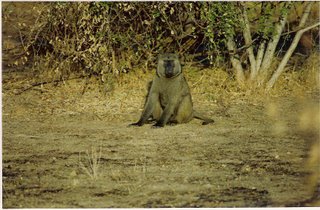 1. What are you looking at, mister? You baboon.
1. What are you looking at, mister? You baboon.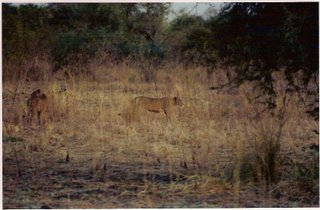
2. A pride of lions. Yes, wild lions. Yes, I took this picture. Yes, I was nervous.
 3. Very majestic.
3. Very majestic. 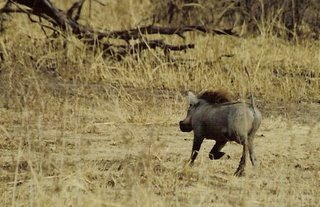
4.This one I call "pumba."
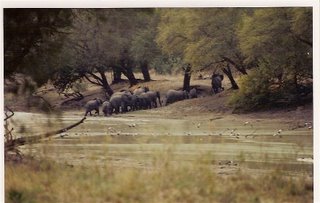
5.Elephants crossing a river at sunset. Later that evening, I got charged by a male bull elephant because I accidently strayed between him and his infant. Bad mistake.
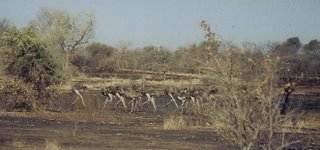
6.Ostriches are famous for sticking their head in the sand to avoid facing a bad situation - remind you of anything? (Hint: our response to genocide)
Wednesday, May 10, 2006
NEWS: Donors legally obliged to aid Sudan: UN food envoy
We often talk about the need to save lives from a moral or ethical perspective - but what about legal? Can other governments be sued for the deaths of millions of people if it can be proved that they did not do everything possible to save them? I still firmly believe that the reason for helping my friends goes far beyond any legal obligations, but if it is true that there are laws in the UN requiring action, then this is potentially another way to put pressure on the international community.
It breaks my heart that the UN has been forced to cut in half the rations it can give out due to lack of money. These are real people who are really starving. Not faceless statistics.
I must say, I am very strongly encouraged by Bush's recent actions (see below). This shows that he is listening and more importantly, leading. We all need to step up the pressure on Congress to pass these funds.
For more up-to-the-minute news about humanitarian emergencies around the world, visit http://www.alertnet.org/index.htm.
Scott
___________________________
GENEVA, May 9 (Reuters) - The United Nations' special envoy on the right to food expressed deep concern over aid cuts to Sudan on Tuesday and said donors were legally obliged to help the African country.
"States ... have the obligation to respond quickly and in an appropriate manner to emergency food situations on the territory of a state member of the United Nations," Swiss sociologist Jean Ziegler said in a statement.
The World Food Programme (WFP) said late last month it was halving its daily food rations to some six million people in Sudan, half of them in Darfur, because of a lack of money.
The Rome-based U.N. agency has only $238 million of the $746 million it needs to feed people in the south, which is just emerging from 20 years of civil war, and in Darfur where more than 2 million have been driven from their homes by violence.
"Member states (must) immediately honour their legal obligations and ensure the realisation of the right to food of the suffering populations ... It is urgently needed to save the lives of thousands of people," said Ziegler, U.N. special rapporteur on the right to food.
On Monday, President George W. Bush diverted five U.S. ships carrying 40,000 tonnes of cereal commodities from Dubai to Sudan and also ordered the shipment of 2,800 tonnes of non-cereal commodities from an emergency stockpile.
The White House is also pressing Congress to approve over $500 million in humanitarian assistance for Darfur, an area the size of France in western Sudan where three years of fighting has killed tens of thousands of people.
"These actions will allow the World Food Programme to restore full food rations to the people of Darfur this summer," Bush said.
Sudan
Monday, May 08, 2006
Repost: How to catch an African bat
_______________________________
For hours of fun on warm, desert evenings look no farther than a pair of pantyhose.
In the Sub-Sahara, where the nights are pitch black and the silence is only broken by the occasional braying of a donkey, evenings can be pretty dull. Most families gather around the fire or oil-fired lantern to tell stories or simply chat. With no primetime TV to distract them, families grow close together. Often, I would go sit on the edge of my cement porch and bury my feet into the cool sand. I would look up to the sky and see the brilliance that is unveiled in the absence of city lights. And then, I would hear the flutter of wings and see the brief flash of fur dart across the sky - bats!
A young friend of mine showed me how to catch bats without hurting them. I will share the secret recipe for fun with you here.
Ingredients:
1 old pantyhose, without large holes
1 medium-sized rock
bats
Directions:
*Place the rock into the pantyhose and let it drop until it is down in the toe. Then, swing it around and around, gaining momentum. At the right moment, release it so that the pantyhose flies high into the night sky. Then, simply wait. Once the pantyhouse and rock drop back to earth, chances are you will have caught yourself a bat.
The trick is that bats use sonar to track down flying insects to eat. Their sonar resonates off of the rock in the pantyhouse and so they attack it. Their claws get stuck in the fabric and they are pulled by the rock back down to earth. At this point, because bats are not good for anything other than catching, you would pick it up, release its claws and let it go. Then, repeat.
_________________
Disclaimer: While this does not harm bats - be careful about getting rabies! Use gloves to remove them to be safe.
________________
My Chronicle Op-Ed Piece
By Scott Sutton
I want you to meet my friend, Ali. He is a young boy with a cheeky smile framing a set of pearly whites that contrast brightly with his dark ebony skin. His eyes light up with mischief as he runs down the sand-filled streets of his village in Chad, Africa.
He pushes in front of him a large, skinny circle made of twisted metal. Using a strip of sugar cane as a guide, he pushes this rolling ring — his only toy — around donkeys, through stacks of firewood, past women washing clothes, and joins a pick-up soccer game forming in the streets. He laughs, he waves and he sets out to play. This is Ali four years ago.
Growing up the son of a missionary doctor on the barren Chad-Sudan border in Africa, I had the privilege of living and playing with many kids like Ali. Their love of life was contagious and their ability to thrive against all odds inspired me. Sadly, things have changed.
This is Ali now: His once bright smile is hidden behind layers of deep sadness. His eyes are listless and cold — staring at nothing. His once-active legs lie motionless on the rocky ground beneath him. Strong, developing muscles are now no more than bone and stretched skin.
He hasn’t laughed in weeks, but more importantly, he hasn’t eaten in days.
His mother is dead. His father is dead. His sister is missing. He is a victim of the brutal genocide taking place today in Darfur. There are more than 3 million others just like him. All of these people — people like my friends — are on the brink of extinction.
The level of suffering and loss of human life at the hands of other humans in Darfur has reached a level not seen since the Holocaust and the genocide in Rwanda. President Bush and Congress call it “genocide,” a legally and politically charged term reserved for the most atrocious crimes against humanity.
Since February 2003, when the Sudanese government authorized a “scorched earth” campaign against its own citizens, more than 400,000 people like Ali have died. More than 2.5 million people like him have been forced to flee into refugee camps.
If people around the world do not stand up for Darfur, then this crisis will not stop. Without pressure from the public, governments will not act. Without international help, the only trace left of an entire ethnic group will be wind-swept bones and charred villages.
For ordinary Americans to do nothing is a license for every other wanna-be dictator and torturer in the coming century to conduct similar campaigns of violence against women and children. We are watching suffering unfold on a massive scale, and history will judge us by our response.
The international community has been too slow to act. The African Union has sent 3,000 troops to secure an area as large as Texas. This is pitiful. Even 3,000 of the best-trained and equipped troops in the world could not provide security for an area this big. The United Nations’ reaction has been mediocre.
It has offered measly amounts of financial aid compared to the amount being spent in Iraq. Meanwhile, it politely asks for the Sudanese government to disarm the Janjaweed — the rogue militias committing these human rights violations. Not surprisingly, the government has done nothing to stop the attacks and nothing to help the victims.
Hopefully, the tide is turning. Last weekend, thousands gathered in Washington, D.C., to hear speeches from politicians from both parties. Celebrities, like George Clooney, urged the United States and the United Nations to increase their presence, their financial support and their pressure to save the lives of the innocent people living in Darfur. Congress is debating several bills and amendments that would increase aid money. President Bush has called the Sudanese president several times during recent peace negotiations. This is good, but not nearly enough.
The Janjaweed has destroyed entire villages, crops and herds of cattle. In a land that is only one bad rainy season away from a severe famine, this tactic is slow murder. Men are beaten and killed in front of their families and women are raped in groups.
The millions who have been forced to flee for their safety have flowed across the border into Chad. They flee to refugee camps that dot the dusty landscape like islands of fear and suffering.
The international community must act now to help the victims and prevent more victims.
Anatomy of a crisis
The crisis that is occurring daily in Darfur did not arrive overnight. In fact, it has been centuries in the making.
In the days before Europeans arrived, the 13 tribal groups of the Darfur region fought and enslaved each other. Then came the Arabs, who brought Islam, Arabic and a nomadic lifestyle to the land of indigenous farmers.
Over time, different people-groups adopted different versions of Islam, thus creating an intro-religious conflict that has its foundations in violence.
Recently, the Sudanese government has been completely controlled by Arab Muslims. The southern and western areas have been shut out of the political process and financially ignored. The black Africans in Darfur decided to organize and fight the government. The better-equipped government forces quickly repelled the rebels, but the Sudanese government did not stop there. In retaliation, it unleashed the Janjaweed on the civilians living in Darfur. They were authorized to rid the land of “unpatriotic” people. What started as a fight between armed combatants is now genocide against an entire race.
Because ethnic groups do not adhere to political borders, refugees are streaming into neighboring Chad for safety.
I remember clearly one tiny village named Farchana that lies alongside a desert “highway.” My family stopped there every trip that we took down that dusty, bumpy road. We pulled over for their fresh roast chicken — the African version of fast food.
Farchana was nothing more than a couple of lean-to shacks thrown up around a few campfires. Today, this location is home to a refugee camp that houses more than 50,000 men, women and children who rely on U.N. handouts to survive.
Genocide’s global impact
Genocide affects us all. We may be American citizens, but we are all members of the human race. To let evil run free and allow it to deny life to joyful, beautiful people is to deny the victims dignity, respect and the very right to live. It is worth repeating that we are watching genocide unfold before our eyes, and history will judge us by our response.
Everyone shakes their head and mumbles a few words about how horrible this situation is — but who is taking action? Women and men, conservatives and liberals, young and old, Muslim and Christian all have a vested interest in the outcome of this crisis and every one of us should be searching for ways to help.
You might not be able to personally hand out water in the desert or fight off the Janjaweed, but the United Nations can. Your role in this crisis can be to show the world that you care and to demand that victims are cared for and that more victims are prevented.
It will take your actions to keep the momentum going. What you do will give children, like Ali, a hope for a future that is free of fear and suffering.
Lecanto resident Scott Sutton lived in Africa’s Chad and Sudan region from 1990 to 2001. To learn more about the conflict in Darfur and how to help, go to www.savedarfur.org.
Darfur: The video game?
"It gets weirder: "CBS Evening News" decided that genocide wasn't newsworthy, devoting only two minutes to coverage of Darfur in all of 2005 - but there's excellent coverage on MTV's university network and in episodes of the TV show "E.R." set in Darfur. And one of the best presentations of life in Darfur is in an extraordinary video game developed with help from MTV and available free at www.darfurisdying.com. In the game, you're a Darfuri, trying to survive as Sudan's janjaweed militias hunt you down. So that's how the response is unfolding to the first genocide of the 21st century: a video game is one of the best guides to understanding the slaughter, and our moral vacuum is filled by teenyboppers and movie stars."
Wow. There is actually a video game online that lets you pretend to be one of my friends over there surviving. You can choose characters, run for water, visit the health clinic, rebuild houses - all the while trying to avoid being killed or raped. I honestly don't know whether to throw up or leap for joy.
On one hand, it is so degrading that my friends and their very real struggle for life and dignity is being captured in a animated computer game. On the other hand, if it gets the youth of this nation interested, then perhaps it is good. At the end of the day, if the video game spurs young people to have a voice and donate money, then it is all worth it. But if at the end of the day, the Darfur genocide is just the plotline for a group of bored MTV fans, then no thanks, I want no part of it.
What do you think? In this day and age, is it approriate to make a video game of a current humanitarian crisis? Leave a me a comment or shoot me an email with your thoughts.
Sunday, May 07, 2006
Kudos to the Chronicle
This past Sunday they ran a full page spread on Darfur on their Commentary page - more than most major newspapers in the country have done. Kudos to the Chronicle. To read the commentary, click here. I will post it later as well.
In addition, the Citrus County Chronicle did a story about me, my life and my passions. You can read that story by clicking here.
ER takes up Darfur cause
This is a great analysis coming from the UK's Guardian. Read it over slowly and digest it.
To read it in full, click here.
________
A few higlights from it:
"The humanitarian disaster unfolding in Darfur was due to receive its most prominent exposure so far on American television last night. But it says much about the interface between politics and celebrity that the coverage was not to be found on any of the three main evening news broadcasts, which have devoted only 10 minutes to the crisis between them since the start of the year. Instead, it was an episode of the hospital drama ER - with the show's heart-throb doctor John Carter (played by Noah Wyle) in the thick of a tragedy the news media have been condemned for neglecting."
"Clooney and fellow celebrities Angelina Jolie and Hotel Rwanda star Don Cheadle are the most high-profile figures in a movement that has been gaining ground for many months, forging an unlikely alliance between leftwing students and rightwing Christians, and spanning both sides of an otherwise bitterly divided Congress. And while humanitarian groups say the Bush administration's response only begins to address the scale of the disaster, it is evident that the campaign has succeeded in influencing the White House."
"The long-term trend is that conservative Christians have become interested in foreign policy questions, including sex trafficking, Aids and third-world debt," said John Green, of the Pew Forum on Religion and Public Life. "They're adopting approaches to evangelising that Roman Catholics, and other protestants, adopted a generation earlier - the notion that in order to effectively bring people to Christ one has to address their economic and social needs as well as their spiritual needs."
Need a motivational/information speaker?
If any one in the state of Florida would like to organize an event or
distribute Darfur information at an already scheduled event, let me
know. Leave a comment with your info or email me. I am ready and
willing to help educate Floridians on the wonderful people behind the
genocide.
Lion is coming!
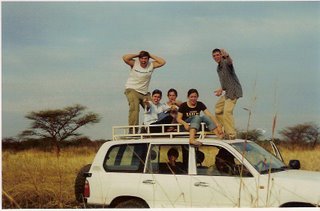
On my most recent trip to Africa, I had the privilege of bringing along a good college friend. I am on the left, my sisters and their friend are in the middle, and my friend is on the right. In case you were wondering, we are all pretending that a lion is about to attack my dad, who is taking the picture. Good times.
The Water Boys
Meet Ibrahim. His hair is tightly braided and his skin is freshly oiled. He rises early in the morning and steps outside his dark hut, squinting at the already bright sun. He shakes some coals and a few weak embers rise. He quickly inserts some dry reeds and a flicker of a flame gives him hope for a hot breakfast. He heats some medidi (a drinkable rice and sugar mixture) and gobbles it down. He knows he needs his strength for the day ahead.
Once his stomach is satisfied, he makes his way through some thorn trees and over some brown grass to the animal pen. He unlatches the goatskin lock and swings open the branch that is doubling as a gate. He enters and approaches his capital investment - a donkey.
The donkey is ornery this morning and backs away from Ibrahim. He shakes his hand and turns his body, as if he is threatening to turn Ibrahim'’s day sour with one swift kick to the midsection. Ibrahim grabs him by his mane and calms him down.
"Agod sakit (Stay still)" he begs the large animal. Finally, with the donkey'’s jitters gone, Ibrahim reaches for a heavy burlap sack and places it on the animal's back. Then follows a coarse pad made of woven straw, a blanket and then a wooden saddle. This saddle is not ordinary for a bar is placed across where a human normally sits. This saddle is not made for joy rides, this is business.
The last touch to add to his steed is the most important piece of equipment - the water sack. This equipment is made out of leather and sits on the saddle. It actually has two large sacks, one sits on either side of the donkey. At the top there is one opening that leads to both sacks and that the bottom corner of each sack is a tied-off opening.
Ibrahim adds the other two essentials tools of the trade -– large buckets and a wooden stick - and he is ready for his commute to work. He makes his way through the quiet streets, through back alleys and under archways. Each house’'s front yard is surrounded by large, mud-brick walls.
He arrives at the well and stands in line. He makes his way closer and closer and pays the Well Master a small fee. He attaches his buckets to the rope and lowers them in to the well. Seconds after they hit the bottom with a splash, he strains and tugs and works the buckets back up to the surface. Once at the top, he empties them into the sacks on the donkey. He repeats this until both sacks are bulging full, seeping water, and the donkey teetering a bit from the load. Then, it's off to make money.
Unless he has specific clients - people who prearrange for his water delivery service -– he has to roam the streets looking for buyers. The way he lets people know that he is walking past their large compound walls is by beating his stick against his buckets. Bang- Bang - Bang. Now the whole block knows a water boy is near.
No luck here so he continues to the next block where a young girl sprints out of her family's gate and calls him over. She points him over to the family barrels where he parks the donkey. Now comes the trickiest part of his job as he must untie the opening to the sacks one at a time and empty the water into his bucket. Then, he must empty his bucket into the barrel. He must do this all while dealing with a donkey who simply doesn't enjoy the task at hand. So Ibrahim gallantly grabs the tie and lets some water through, the donkey jolts and sends water (money) crashing to the dry ground. Ibrahim readjusts and tries again. On his fourth or fifth time, he gets a full bucket. He ties off the sack and dumps it in the barrel. Once the barrel is full, the young girl pays him and he is done.
It's off again to the well, to continue his job as the town'’s plumbing system -– yet another way the people of Darfur have ingeniously beaten the odds.
In Darfur, when the going gets tough, the tough get going. Survival is not an option and the people are so creative. They manage to find a solution to every problem. They reuse everything and waste nothing. These very people are now the victims of genocide. Please, help me take a stand for them and end their unjust murders.


